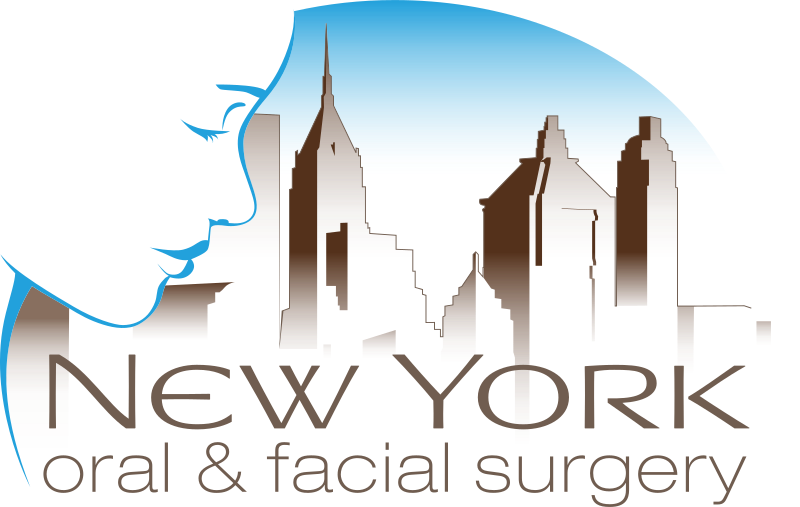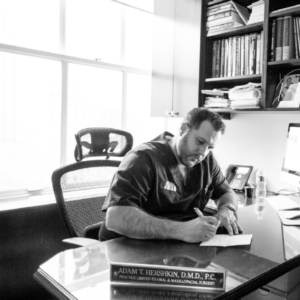Oral Examination
With an oral examination and x-rays of the mouth, Dr. Hershkin can evaluate the position of the wisdom teeth and predict if there are present or future potential problems. Studies have shown that early evaluation and treatment result in a superior outcome for the patient. Patients are generally first evaluated in the mid-teenage years by their dentist, orthodontist, or by an oral and maxillofacial surgeon.
All outpatient surgery is performed under appropriate anesthesia to maximize patient comfort. Dr. Hershkin is trained, licensed, and highly experienced in providing various types of anesthesia for patients.
What is Wisdom Tooth Removal?
Wisdom tooth removal entails extraction of teeth that are either diseased or in a position that is not maintainable by the patient and/or the dentist. This can be accomplished with local anesthesia, local anesthesia with nitrous oxide (laughing gas) or with intravenous sedation.
Why Should I Have My Wisdom Teeth Removed?
If you do not have enough room in your mouth for your third molars to fully erupt, a number of problems can happen. Impacted wisdom teeth are ideally removed before their root structure is fully developed. This drastically decreases the difficulty and thus several of the risks of the surgery. In some patients it is as early as 12 or 13, and in others it may not be until the early twenties. Problems tend to occur with increasing frequency after the age of 30. Some of the possible problems related to not removing your wisdom teeth include:
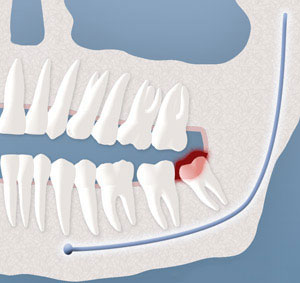
Infection:
The most frequent clinical problem we see is pericoronitis, (a localized gum infection). Without enough room for total eruption, the gum tissue around the wisdom tooth can become irritated and infected, resulting in recurrent pain, swelling, and problems with chewing and/or swallowing.
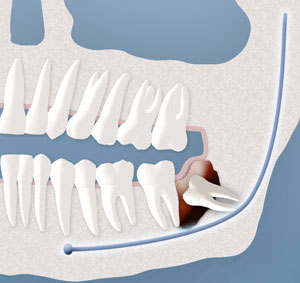
Cyst Formation:
Non-infectious diseases may also arise in association with an impacted wisdom tooth. Cysts are fluid-filled “balloons” inside the jaw bone that develop as a result of impacted teeth and slowly expand destroying adjacent jaw bone and occasionally teeth. They can be very difficult to treat if your wisdom teeth are not removed in your teenage years. Although rare, tumors can be associated with the delayed removal of wisdom teeth.
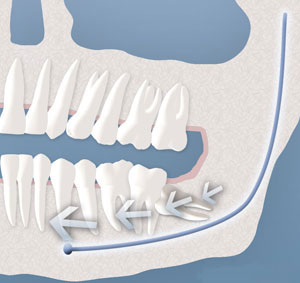
Possible Crowding:
Impacted wisdom teeth may contribute to crowding of your teeth. This is most noticeable with the front teeth, primarily the lower front teeth and is most commonly seen after a patient has had braces. There are a number of factors that cause teeth to crowd after braces or in early adulthood. Retained, impacted wisdom teeth may be a contributing factor. Unless you have an active problem when you see the oral surgeon, the reason for removal is primarily to prevent long-term damage to your teeth, gums and jaw bone.
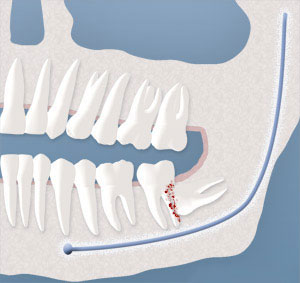
Damage to Adjacent Teeth:
If there is inadequate room to clean around the wisdom tooth, the tooth directly in front, the second molar, can be adversely affected resulting in gum disease, bone loss around the tooth, and/or decay.
What If I Don’t Have My Wisdom Teeth Removed As A Teenager Or Young Adult?
As wisdom teeth develop, the roots become longer and the jaw bone more dense. The longer tooth roots are often in closer approximation to the underlying nerve which can increase the risk of injury to that nerve. When it is necessary to remove impacted wisdom teeth in your thirties, forties or beyond, the post-operative course can be prolonged and there is a higher complication rate. Treating these complications is often more difficult and less predictable than with a younger patient. Healing may be slower and the chance of infection can be increased. If your impacted wisdom teeth are not removed in your teenage years or early in your twenties and they are completely impacted in bone, it may be advisable to wait until a localized problem (such as cyst formation or localized gum disease and bone loss) develops. In general, you will heal faster, more predictably and have fewer complications if treated in your teens or early twenties.
What Happens On The Day Wisdom Teeth Are Removed?
Most people prefer to be unaware of the experience when they have their wisdom teeth removed and usually decide to be sedated. You will be provided with appropriate anesthesia options at your consultation. All outpatient surgery is performed under appropriate anesthesia to maximize your comfort. Our office staff has the training, licensing, and experience to provide the various types of anesthesia. These services are provided in an environment of optimum safety, utilizing modern monitoring equipment and a well-trained experienced staff.
If you will have intravenous anesthesia, it is required that a parent or responsible adult accompanies you to the office and plans to stay with you the rest of the day. The procedure will take about 30 to 60 minutes and you will probably be in the office for 90 minutes. Recent advances in medicine and technology allow patients to undergo wisdom tooth removal in a manner which promotes rapid healing and minimal post-operative discomfort. State of the art sterilization and infection control techniques are used at all times.
If you will have intravenous anesthesia it is essential that you have nothing to eat or drink (excluding prescription medications with a sip of water) for at least 6 hours (preferably longer). This does not mean you should try to fit in one “last meal” exactly six hours before your surgery. Having anything in your stomach can increase the risk for serious anesthetic complications, including nausea and vomiting. Your procedure will be rescheduled if you have not heeded these guidelines. When you are seated in the surgical room, we will make every effort to make you as comfortable as possible. If you are going to be sedated, Dr. Hershkin will place an IV into your arm. This is a quick and nearly painless procedure that ensures optimal delivery of your medication. Local anesthesia is given to you after you are sedated to ensure comfort, and allow adequate time to travel home and rest. You will be sleepy for a significant portion of the day.

The Day of Treatment
Be sure to have an adult with you at the time of removal. Make plans to have a parent or responsible adult stay with you for the rest of the day, following wisdom tooth removal.
If your surgery requires stitches, these are usually the type that dissolve in 3 to 5 days and do not require removal. You may also notice a sensation of your gums feeling swollen and pulling away from your teeth. This is all part of the normal recovery, and will subside in several days.
Once the local anesthesia wears off, you may require prescription pain medication. Please try non-narcotic anti-inflammatory medications such as ibuprofen (Advil®) first, to see if that adequately treats your pain. If not, begin your other prescription pain medication. The local anesthesia may last until the following day, and should not be confused with an injury to your nerve. We recommend starting your post-operative diet with clear liquids such as jello and broths, gradually increasing in substance as your body permits.
We do not recommend using dairy products such as yogurt, ice cream or milkshakes on the day of surgery, as nausea and vomiting may develop in conjunction with the anesthetic and pain medication. If you are given antibiotics and you take birth control pills, please be aware that the birth control pills might become ineffective and take appropriate precautions.
What Does Wisdom Tooth Removal Cost And Is It Covered By Insurance?
The fee for your treatment is determined by a number of factors. These may include the difficulty involved in removing your teeth and which type of anesthesia is best for you. During your consultation appointment, the surgeon will need to review your x-rays, complete an examination and determine the best option for anesthesia, before an accurate estimate can be provided. Every insurance company has a different policy regarding the extent of coverage for a given surgical procedure. Dr. Hershkin’s office staff will help you obtain maximum insurance coverage for your treatment.
What are the potential risks for Wisdom Tooth Removal?
Like all surgeries, the generalized risks are pain, swelling, infection and bleeding. Pain and swelling are usually mild to moderate with the worst being the first 48-72 hours. Most patients are out of pain or close to it by the time they return for their one week postoperative visit. Infection is unlikely, especially in young healthy patients. Bleeding usually stops within a few hours after the surgery from biting on gauze. While it is normal to have a bit of red in your saliva for a few days after the surgery, problem bleeding is exceedingly rare.
Upper wisdom teeth frequently stick up into the sinuses to some degree and in rare cases there can be a small perforation into the sinus floor. This can lead to symptoms such as stuffiness, nose bleed, sinus infection or feeling air or fluid passing between the mouth, sinus and nose.
This issue is treatable and usually resolves within 1-3 weeks and is fixable with minor surgery in the even more rare case that it does not heal on its own.
Lower wisdom teeth are close to and sometimes touching the inferior alveolar nerve, which is responsible for feeling to the lower lip, chin and jaw on either side. This nerve is for feeling only and does not move any muscles so if it is affected by the surgery the patient would feel numb or tingly in those areas but would not have any change in appearance or function. The overall incidence of nerve injury with lower wisdom teeth is 0.3% and is almost always temporary with feeling returning to normal in weeks to months. The position of the teeth to be removed in relation to the nerve is determined by xrays and in cases in which the risk is elevated a CT scan, which is a 3D xray, will be taken to further evaluate.
What If I Have Questions Before Surgery?
At the time of your consultation, your specific situation will be discussed in greater detail. We encourage you to ask any questions you may have. If new questions arise after your consultation, please call our office at 212-355-8500 to speak to one of our patient care coordinators.

The Day of Treatment
Please do not eat or drink anything prior to your surgery. Having anything in your stomach can increase the risk for serious anesthetic complications.
Are there related treatments to Wisdom Tooth Extraction?
Coronectomy is a procedure that is usually reserved for extreme cases in which removing the entire wisdom tooth would cause unacceptable damage or risk to adjacent anatomical structures. This procedure involves removing only the crown of the tooth and purposely leaving
the roots in the jaw.
